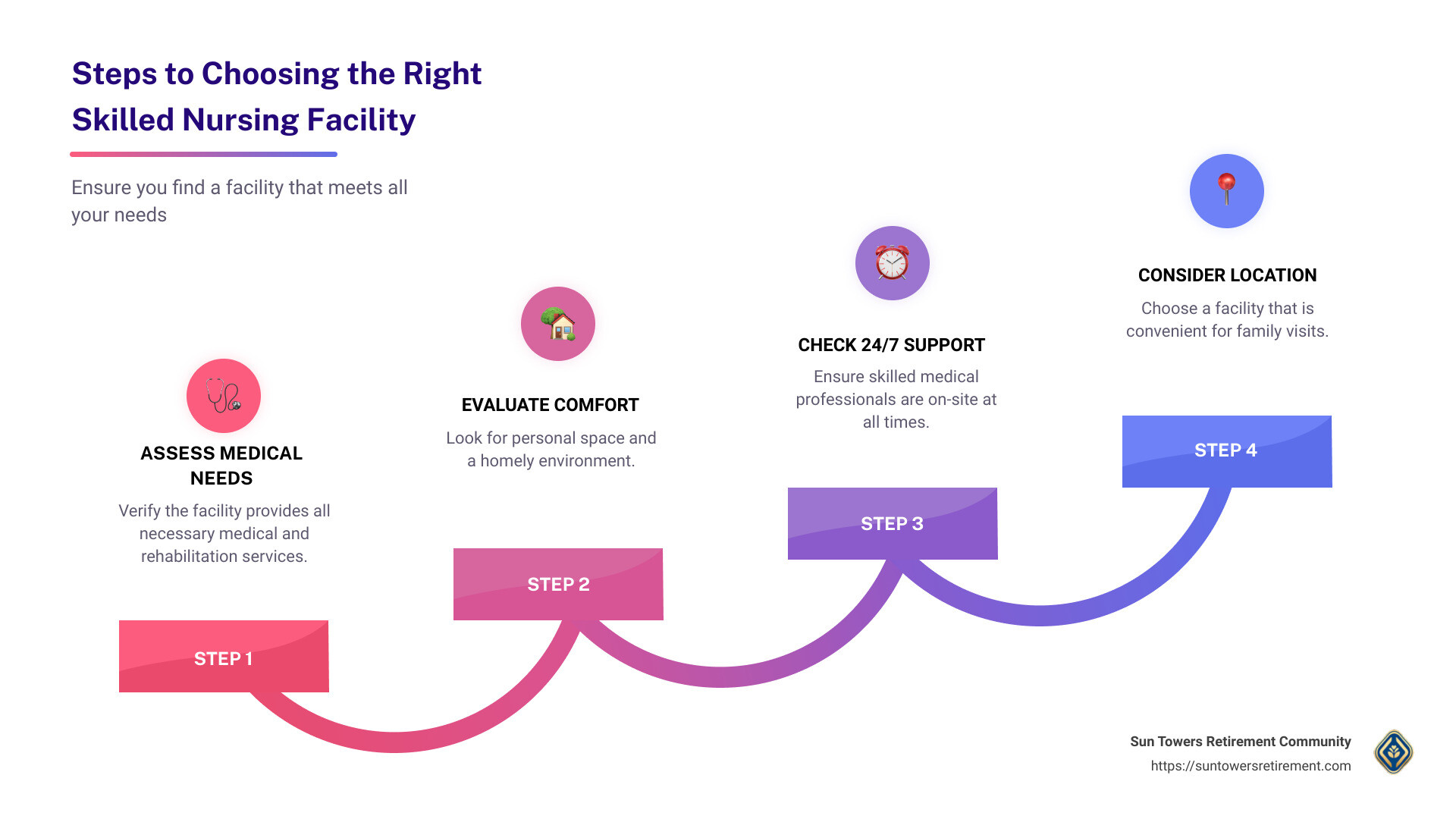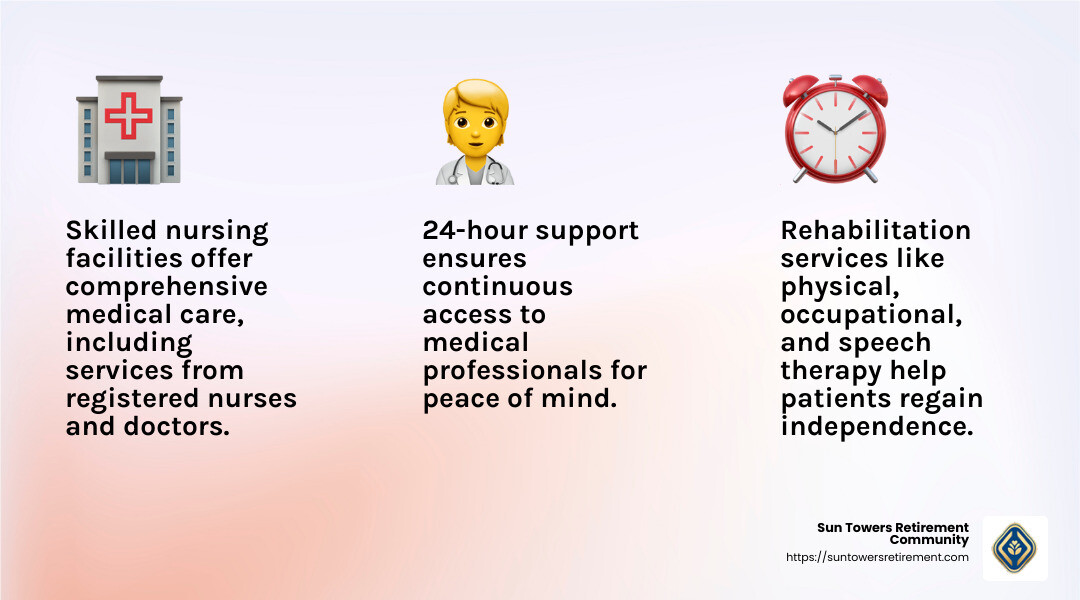Skilled Nursing Facilities: Top 5 Best Choices 2024
Skilled nursing facilities play a crucial role in providing essential care for those who need medical monitoring, round-the-clock care, or rehabilitation services. Whether recovering from surgery or managing a chronic condition, these facilities offer a bridge between hospital care and returning home, or in some cases, provide long-term support.
Quick Tips for Selecting the Best Skilled Nursing Facility:
1. Assess Medical Needs: Ensure the facility provides necessary medical and rehabilitation services.
2. Evaluate Comfort: Look for personal space and homely environments.
3. Check Availability of 24/7 Support: Verify that skilled medical professionals are on-site at all times.
4. Consider Location and Access: Choose a facility that’s convenient for family visits.
The transition into a skilled nursing facility can be daunting. However, with the right facility, it can also be a rewarding step that supports recovery and improves quality of life. Skilled nursing facilities not only offer personalized medical care, but they also create nurturing environments that facilitate emotional and social well-being.
Important skilled nursing facilities terms:
– care centers
– nursing care facility
Understanding Skilled Nursing Facilities
Skilled nursing facilities provide a unique blend of medical care, rehabilitation, and 24-hour support. These facilities are designed to meet the complex needs of patients who require more than just basic care.
Medical Care
At the heart of skilled nursing facilities is their ability to deliver comprehensive medical care. This includes services from registered nurses, doctors, and various specialists. Patients often transition to these facilities after a hospital stay to continue receiving necessary medical treatments. Medicare typically covers stays up to 20 days, with some costs extending up to 100 days, highlighting the importance of these facilities in the continuum of care.
Rehabilitation Services
Rehabilitation is a key component of skilled nursing facilities. They offer various therapies, such as physical, occupational, and speech therapy, to help patients regain their strength and independence. For example, a patient recovering from a stroke might receive intensive physical therapy to improve mobility and speech therapy to improve communication skills. These therapies are crucial for patients who need to recover function before returning home.
24-Hour Support
One of the standout features of skilled nursing facilities is their 24-hour support. This round-the-clock care ensures that patients have access to medical professionals whenever they need it. Whether it’s monitoring vital signs, administering medications, or assisting with daily living activities, the staff is always ready to help. This constant support gives both patients and their families peace of mind, knowing that help is always available.
Creating a Home-Like Environment
Beyond medical and rehabilitation services, skilled nursing facilities strive to create a home-like environment. Personalizing spaces with familiar mementos can help patients feel more comfortable and relaxed, which can aid in recovery. This approach not only meets medical needs but also supports emotional well-being.
In summary, skilled nursing facilities are designed to provide comprehensive care through medical services, rehabilitation, and continuous support. They serve as a bridge between hospital care and home, ensuring patients receive the care they need in a supportive and nurturing environment.
Key Services Offered by Skilled Nursing Facilities
Skilled nursing facilities are not just about medical care; they offer a range of services that cater to various patient needs. Here’s a closer look at the key services provided:
Nursing Care
Nursing care is the backbone of skilled nursing facilities. It involves monitoring patients’ health, administering medications, and providing wound care. Licensed nurses are available around the clock to ensure each patient’s health needs are met promptly. This constant care is crucial for patients recovering from surgeries or managing chronic conditions.
Physical Therapy
Physical therapy is a vital service aimed at helping patients regain strength and mobility. Whether recovering from a hip replacement or a stroke, patients receive personalized exercise plans to improve their physical abilities. Facilities often have state-of-the-art equipment to support these therapies, ensuring patients have the best tools for their recovery journey.
Occupational Therapy
Occupational therapy focuses on helping patients regain the skills needed for daily living. This might include activities like dressing, bathing, or cooking. Therapists work closely with patients to develop strategies that improve their independence and improve their quality of life. For example, they might teach adaptive techniques to someone who has lost fine motor skills due to an injury.
Speech Therapy
Speech therapy is essential for patients who have experienced speech or swallowing difficulties, often due to neurological conditions like strokes. Speech therapists work with patients to improve their communication skills and swallowing abilities. Techniques such as VitalStim, a type of neuromuscular electrical stimulation, are sometimes used to aid those with swallowing issues.
Social Services
Social services play a critical role in supporting the emotional and social well-being of patients. Social workers assist with discharge planning, coordinate care with families, and connect patients with community resources. They ensure that patients and their families have the support they need during their stay and as they transition back home.
These services make skilled nursing facilities a comprehensive care option for individuals needing medical, rehabilitation, and social support. From nursing care to therapy and social services, these facilities ensure patients receive holistic care custom to their specific needs.
How to Choose the Best Skilled Nursing Facility
When searching for the best skilled nursing facilities, focus on a few key factors: personalized care, comfort, convenience, and 24-hour service. These elements ensure that you or your loved one will receive the highest quality of care in a supportive environment.
Personalized Care
Personalized care is at the heart of what makes a skilled nursing facility stand out. Facilities should tailor their services to meet the unique needs of each resident. This means not only addressing medical requirements but also considering personal preferences and lifestyle. For example, some facilities allow residents to bring their own furniture and mementos, creating a familiar and comforting environment.
Comfort
Feeling at home can significantly impact recovery and overall well-being. Facilities that prioritize comfort often allow residents to personalize their spaces. This familiar atmosphere can help improve mental health and speed up recovery. According to research, a comforting environment can make a big difference in how quickly residents feel better.
Convenience
Convenience is another critical factor. A facility that offers a range of services on-site, such as physical, occupational, and speech therapy, can save residents and their families time and stress. Additionally, having these services available means that residents don’t have to travel far to receive the care they need. This is especially important for seniors who may have difficulty driving or traveling long distances.
24-Hour Service
Round-the-clock service is essential for peace of mind. Knowing that licensed nurses are available 24/7 ensures that any health issues are addressed immediately. This level of care is crucial for those with medical conditions that require constant monitoring or for individuals recovering from surgery or illness.
In summary, when choosing a skilled nursing facility, look for one that offers personalized care, prioritizes comfort, provides convenient services, and ensures 24-hour support. These factors will help ensure that residents receive comprehensive care in a setting that feels like home.
Frequently Asked Questions about Skilled Nursing Facilities
What is the difference between skilled nursing and long-term care?
Skilled nursing facilities and long-term care are often confused, but they serve different purposes. Skilled nursing provides complex medical care and rehabilitation services for patients who need short-term, intensive support. This typically includes nursing care, physical therapy, and other therapies aimed at recovery after hospitalization.
Long-term care, on the other hand, is more about providing permanent support for individuals who cannot live independently due to chronic illness or disability. It focuses on daily living assistance rather than intensive medical treatment.
What services are typically covered in skilled nursing?
In a skilled nursing facility, you can expect a wide range of services designed to meet both medical and personal needs. These include:
-
Nursing care: This involves round-the-clock support from registered nurses who manage medications, monitor vital signs, and provide wound care.
-
Therapy services: Facilities offer physical, occupational, and speech therapy to help residents regain independence and improve daily functioning.
-
Medications and equipment: The facility provides necessary medications and medical equipment to support recovery and daily activities.
Which type of service is performed in a skilled nursing facility?
Skilled nursing facilities offer specialized services that are not typically available in other care settings. Some of these services include:
-
Wound care: Professional management of wounds to promote healing and prevent infections.
-
IV therapy: Administration of intravenous medications and fluids, crucial for patients who need intensive medical treatment.
-
Vital signs monitoring: Regular checks of blood pressure, heart rate, and other vital signs to ensure residents’ health is stable.
These services make skilled nursing facilities a vital option for individuals needing comprehensive medical care and rehabilitation. By understanding the differences and services offered, families can make informed decisions about the best care setting for their loved ones.
Conclusion
At Sun Towers Retirement Community, we understand the importance of finding the right care for your loved ones. Our approach to care is centered around a continuum of care that allows residents to “Age in Place.” This means they can transition seamlessly between different levels of care, from Independent Living to Assisted Living, Memory Care, and Skilled Nursing—all under one roof.
Our skilled nursing facilities are designed to provide a home-like environment while offering 24/7 medical support. This ensures that residents receive the care they need without the stress of moving to a different facility as their needs change.
Choosing a skilled nursing facility is a significant decision. At Sun Towers, we offer personalized care plans custom to the unique needs of each resident. Our team of skilled professionals, including registered nurses and therapists, works collaboratively to ensure optimal health and well-being.
Aging in Place at Sun Towers means more than just receiving medical care. It’s about maintaining a fulfilling lifestyle, staying connected with friends and family, and enjoying the amenities and activities our community offers. We believe in enriching the lives of our residents through engagement, support, and compassionate care.
If you’re considering a skilled nursing facility for your loved ones, we invite you to visit Sun Towers Retirement Community. Experience our commitment to providing exceptional care and a welcoming community where residents can thrive.




















